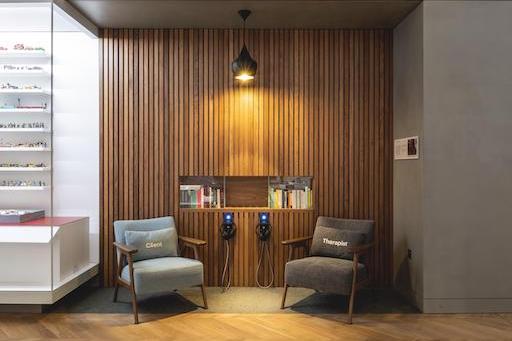Medicine and treatments
Inside the Therapist’s Room: The Patient’s chair

Inside the Therapist’s Room exhibit in the Medicine and Treatments Gallery at the Science Museum, 2019 © The Board of Trustees of the Science Museum, London
Lee Brookes
My name’s Lee Brookes, I’ve been
a service user for 11 years. I had mental
health issues since I was a teenager which
I only found through talking to my
psychologist and through therapy.
I’ve got bipolar disorder with sort of anger
management issues. I’ve been
to therapy with five or six different therapists.
When I first started therapy, I felt really
uncomfortable. Meeting someone new can
be really difficult and meeting somebody new
you’re putting all of your eggs in one
basket and then you’re going to open up
and tell them everything can be
very, very difficult.
My current therapist… she’s phenomenal. She makes me very at ease. But there is a very distinct line of,I don’t want to make this sound too clinical, but service provider. But it’s a very, very distinct line she knows when not to pander to me and when she needs to dig deeper to find out what is going on with me at that particular time.
Sometimes I talk a lot. I mean there have literally been sessions where we’ve come in she’s said hello, we’ve gone through the formalities, and then I’ve talked to ten to the dozen and she’s gone right time’s up and I’ve gone what?!
And there are other times where because I’ve been a little bit withdrawn about some things she’s talked a lot to get me back out.
We might do an eight-week session and then she’ll say to me right I want you to have some time off and put into practice the tools we’ve been working with. She doesn’t want me to become self-reliant on therapy or self-dependent on therapy at all.
One of the medications I take is a mood stabilizer, and even’s me out so the dips between the highs and the lows aren’t as bad. I don’t really get them anymore because that’s where the therapy and the tools that I’ve learnt in the therapy, balance out the medication.
Jaabir Ramlugon
I’m Jaabir I’ve got I’ve got borderline personality disorder and I work for a mental health charity in in my local area.
I’ve been I’ve been through quite a few different different types of therapy through different parts of my life.
I feel that although the therapies that I’ve had in the past have helped me, they haven’t really had a long term effect. They’ve helped me in the short term.
Mentalisation based therapy is the one I’m doing right now and that’s focused on people with borderline personality disorder. So it’s looking at the way you think about the world and with generally people with borderline personality disorder have kind of skewed view of events that are happening around them.
Typically during during the therapy session I feel a bit frustrated actually because sometimes I might feel that the therapist is not getting my point of view. Sometimes you think well I just want you to give me the answer. But then over time you realise that there really isn’t an answer. It’s just about looking at things in a different way and finding your own way which I think over time we realise is important because otherwise you then become reliant on the therapist
to get you those.
I can also there usually seems to be some light bulb moments in therapy where I just think oh my goodness I didn’t actually think about that. And so it’s quite a mix mix of emotions in therapy.
Then after the session I generally feel
Pretty bad. So I’ve generally got a
headache.
Usually I treat myself to a latte after
so I’m like I’m going to have my latte,
my therapy latte.
I’m feeling a lot better than I did before. I’ve taken on some work at my local a local Mind actually and I feel that the therapy has allowed me to do that and keep, keep the job all It’s also helped me to come off my medication gradually
My psychotherapy which is changing my life, I am taking on things that I never thought I’d be able to
do and I’m in a place where I didn’t think I would be.